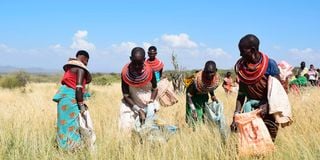Samburu women take lead in restoring degraded pastures

Samburu women harvesting grass seeds along the buffer zones in Westgate Community Conservancy in Samburu East.
What you need to know:
- During the dry seasons, the Samburu women have been clearing the invasive Acacia reficiens to pave way for reseeding the rangelands.
- The Acacia reficiens, also known as false umbrella thorn, invades rangelands and desert-like lands and nothing grows under it or around it, causing the land to become barren.
- After clearing the invasive plants, the indigenous grass seeds are broadcast in time for the rains.
On a sweltering Saturday at Westgate Community Conservancy, Agnes Lekoyian leads dozens of Samburu women harvesting grass seeds in the vast dry rangelands.
With nimble fingers, the women deftly pluck the dry grass seeds, while carefully putting them in sacks and baskets.
Ms Lekoyian is visibly tired amid searing temperatures, but she remains determined.
“ It is cumbersome but we know it will pay off in the near future,” she says.
Next to her is 34-year-old Nankana Lenangetai, a mother of four who is holding a gunny bag brimming with the bounty of tiny featherlight indigenous grass seeds. Ms Lenangetai spends most of her day harvesting the seeds.
When Healthy Nation visits, she tells us that she aims to collect 50kg that day.
“This is my daily routine. After my house chores, I spend my time here collecting grass seeds. We decided to take the lead to help combat climate change and issues of insecurity,” she says.
After collecting enough seeds, Ms Lenangetai and other women sell them to the conservancy Westgate Community Conservancy for reseeding. The conservancy pays them Sh3,000 for a single bag of grass seeds. Through selling these seeds, the women are able to make enough money to buy livestock and start small businesses in the village.
During the dry seasons, the Samburu women have been clearing the invasive Acacia reficiens to pave way for reseeding the rangelands. The Acacia reficiens, also known as false umbrella thorn, invades rangelands and desert-like lands and nothing grows under it or around it, causing the land to become barren. After clearing the invasive plants, the indigenous grass seeds are broadcast in time for the rains.
“We plant them using broadcasting methods. After rains, there will be massive sprouting and germination in this rangeland. If you come here a week afterthe rains, you will see the contrast,” says Ms Lenangetai.
The women’s move has led to restoration of Westgate’s rangelands since 2013. Their initiative is supported by the Northern Rangelands Trust (NRT), which supports 39 community conservancies in the country and local communities, including the Westgate Community Conservancy in Samburu East.
Perennial insecurity due to clashes over pasture and frequent droughts are some of the factors that prompted the women in the conservancy to take part in the programme. Conflicts with other pastoralists usually occur when they invade areas in search of pasture during long dry spells.
And women have been caught up in conflicts over scarce resources and water especially on the Samburu East lowlands.
Alex Lekalaile, the rangeland coordinator in Westgate Community Conservancy, notes that the grass growing initiative has salvaged their grasslands around buffer zones in the conservancy.
After reseeding them in the rangelands, Mr Lekalaile says there are grazing committees that decide on the patterns of grazing in the conservancy. Primarily, all herders must stay away from the entire area under grazing management to allow grass to grow to maturity.
He says there is a need for the practice of controlled grazing in a bid to save livelihoods during droughts.
“We have a buffer zone being managed by grazing committees where grazing is controlled to allow rangeland regeneration. The women are taking the lead in plucking grass seeds for reseeding programmes,” says Mr Lekalaile.
Overgrazing has damaged soils, resulting in a significant reduction in grass that grows back each year, according to Mohammed Shibie, the director of Rangelands and Carbon Project at the NRT. As a result, Mr Shibie says cattle are becoming emaciated and herders are increasingly fighting over limited resources.
“Previously, locals in Westgate Community Conservancy identified degradation as a major issue. That is why the community came together and decided to grow grasses to improve rangelands so that their livestock and wildlife continues to thrive,” says Mr Shibie.
The official explains that the women work with the conservancy stakeholders to combine traditional and modern ways of grazing livestock to restore grasslands. In addition to addressing climate changes and conservation, the carbon projects chips in to capture more atmospheric carbon to sell to international markets.
That carbon is then sold as offsets on the global carbon market to earn the women and other community members sustainable income, support the conservation, protect endangered wildlife and address climate changes.
“The grass growing and rangeland management is benefiting the community in several ways including carbon credits. The revenue from carbon credits are usually ploughed back as schools bursaries , building of infrastructure, and other social amenities,” Mr Shibie says.
Mr Shibie says the conservation efforts trickle down to wildlife in the conservancy and lately, there has been an increase of reticulated giraffes and the grevy’s zebra.





